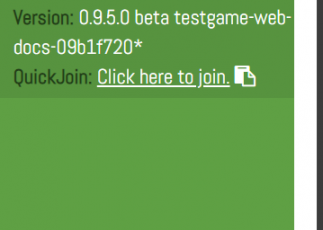URI Commands
Starting with Eco 9.4 the game client now supports its own custom Uri protocol on Windows. This protocol can be used to quickly access startup options for Eco as well as be used for implementing custom launcher type applications. Such as a quick join link on a community website.
Initial Setup[edit | edit source]
Currently because Eco does not have a dedicated installer you must run the Eco client at least once before the eco:// Uri protocol will be recognized by Windows. This first time setup runs the ClientSetupUtility.exe application to configure your machine to accept Eco's protocol.
Notice: The protocol will stop working if you move the game's install. To configure the protocol simply run the game again or launch the ClientSetupUtility found in the install folder directory.
Server QuickJoin Links[edit | edit source]
A QuickJoin link can now be found on all Eco servers starting with version 9.4. This link can be found as a button under server version. Clicking the QuickJoin button will automatically launch Eco and start connecting to the server. QuickJoin respects the configured server password and will force the user to enter it once the game launches if configured.

There is also a copy to clipboard button next to the QuickJoin link that will copy the sharable QuickJoin link to your clipboard to share with your friends.
Supported Commands[edit | edit source]
All of Eco's Uri commands start with the eco:// prefix. This creates a valid link that can be shared, used in Windows shortcuts, website links, ect. Anything that accepts a valid website URL should be able to execute a Eco Uri command.
Currently the following commands are supported:
| Command | Description |
|---|---|
| eco://run/ | Simply starts the Eco client with no startup options. |
| eco://connect/<serverid> | Starts the Eco client and connects to the supplied server identifier. This server id can be found in your networking configuration page on the Eco server. |